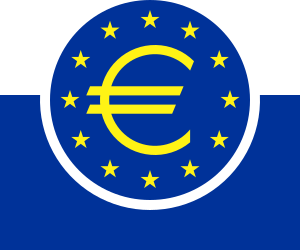 |
| German Logo of the ECB. (Photo credit: Wikipedia) |
The European Central Bank (ECB) is the sixth of the seven institutions of the European Union (EU) as listed in the Treaty on European Union (TEU). It is the central bank for the euro and administers the monetary policy of the 17 EU member states which constitute the Eurozone, one of the largest currency areas in the world. It is thus one of the world's most important central banks.
The capital stock of the bank is owned by the central banks of all 27 EU member states. The bank was established by the Treaty of Amsterdam in 1998, and is headquartered in Frankfurt, Germany. The current President of the ECB is Mario Draghi, former governor of the Bank of Italy.
The primary objective of the European Central Bank is to maintain price stability within the Eurozone, which is the same as keeping inflation low and preventing deflation. The Governing Council aims to keep inflation (as measured by the Harmonised Index of Consumer Prices) below, but close to, 2% over the medium term. Unlike other central banks, for instance, the Federal Reserve System, the ECB has a single primary objective, with other objectives subordinated to it.
The basic tasks of the ECB are to define and implement the monetary policy of for the Eurozone, to conduct foreign exchange operations, to take care of the foreign reserves of the European System of Central Banks and to promote smooth operation of the financial market infrastructure under the TARGET2 payments system and the technical platform (currently being developed) for settlement of securities in Europe (TARGET2 Securities).
Furthermore, it has the exclusive right to authorise the issuance of euro banknotes. Member states could issue euro coins, but the amount must be authorised by the ECB beforehand (upon the introduction of the euro, the ECB also had exclusive right to issue coins).
On 9 May 2010, the 27 member states of the European Union agreed to incorporate the European Financial Stability Facility. The EFSF’s mandate is to safeguard financial stability in Europe by providing financial assistance to Eurozone Member States.
The bank must also co-operate within the EU and internationally with third bodies and entities. Finally it contributes to maintaining a stable financial system and monitoring the banking sector. The latter can be seen, for example, in the bank's intervention during the 2007 credit crisis when it lent billions of euros to banks to stabilise the financial system.
Although the ECB is governed by European law directly and thus not by corporate law applying to private law companies, its set-up resembles that of a corporation in the sense that the ECB has shareholders and stock capital. Its capital is five billion euro which is held by the national central banks of the member states as shareholders. The initial capital allocation key was determined in 1998 on the basis of the states' population and GDP, but the key is adjustable. Shares in the ECB are not transferable and cannot be used as collateral.
The bank is based in Frankfurt, the largest financial centre in the Eurozone (although not the largest in the European Union). Its location in the city is fixed by the Amsterdam Treaty along with other major institutions. In the city, the bank currently occupies Frankfurt's Eurotower until its purpose-built headquarters are built.
The owners and shareholders of the European Central Bank are the central banks of the 27 member states of the EU. The ECB should not be confused with the European Investment Bank (EIB), the development bank owned by the EU member states.







0 Comment:
Post a Comment